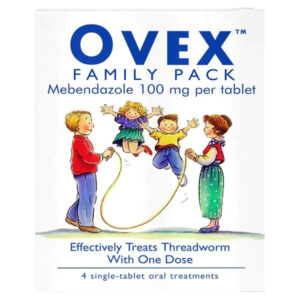Worms
Child worm medicine is specifically formulated to target parasitic worm infestations in young children, including pinworms, roundworms, and tapeworms. These infestations often manifest with symptoms such as itching, abdominal pain, and the presence of visible worms in stools. Our range of over-the-counter worm medicine for infants offers effective relief, targeting both adult worms and their eggs. Read More…

-

Ovex Tablets Threadworms Treatment
- Active Ingredient : Mebendazole
- Kills Adult Worms & Their Eggs
- Buy With Confidence From UK Registered Pharmacy
£4.99 – £12.49 Select options -

Ovex Suspension Banana Flavour – 30ml
- Ovex Suspension Banana Flavour
- Family Pack 6 Liquid Doses (30ml)
- Active Ingredient: Ovex Mebendazole
£14.49 Select options
-
About The Condition: Worm Infestations in Infants
Worm infestations, particularly threadworms, are common in infants and children. These parasites can easily spread from person to person, especially in settings where hygiene may not be optimal. Threadworms lay eggs around the anus, leading to itching, particularly at night. Infected individuals may also experience discomfort, loss of appetite, and disturbed sleep.
Preventive measures include maintaining good hygiene practices, such as washing hands before eating and after using the toilet, trimming fingernails, and regularly washing bedding and pyjamas. Additionally, avoiding contact with infected individuals and their personal items can help prevent worm infestations. Regular check-ups with a healthcare professional can ensure prompt diagnosis and treatment if an infestation occurs.
-
Symptoms
Infants with worm infestations may experience various symptoms, including itching around the anus, particularly at night, due to the presence of threadworms. Other common symptoms include disturbed sleep, irritability, loss of appetite, and sometimes, weight loss.
Over-the-counter worm medicines containing mebendazole are often effective in treating worm infestations in infants. These medications work by killing the worms in the digestive tract, helping to alleviate symptoms and eliminate the infection.
It’s important to follow the dosage instructions carefully and consult a healthcare professional before administering any medication to infants. In addition to medication, maintaining good hygiene practices is crucial to prevent reinfection and the spread of worms.
-
Diagnosis
Diagnosing worm infestations in infants typically involves observing their symptoms and sometimes examining stool samples. Healthcare providers may ask about symptoms like itching around the anus, disturbed sleep, and irritability. They may also look for signs of worms in stool samples under a microscope.
Additionally, the “Scotch tape test” is a simple diagnostic method where a piece of clear tape is pressed against the skin around the anus and then examined under a microscope for eggs or worms. It’s essential to consult a healthcare professional for an accurate diagnosis and appropriate treatment if worm infestation is suspected in infants.
-
Treatment
The treatment for worm infestations in infants often involves the use of over-the-counter medications specifically designed to eliminate the worms. One such medication is Ovex, available in tablet and suspension forms. Ovex Tablets contain Mebendazole, an active ingredient that effectively kills adult worms and their eggs, helping to alleviate the symptoms and eliminate the infestation.
For ease of use, especially in infants, Ovex Suspension Banana Flavour is available. This liquid form comes in a family pack with six doses, each containing 30ml of the suspension. It also contains Mebendazole and is easy to administer to infants.
It’s important to follow the instructions provided with the medication and consult a healthcare professional before administering any treatment to infants.
-
Prevention Strategies
Preventing the recurrence of threadworm infections involves a combination of good hygiene practices and environmental measures. Here are some tips:
- Hand Hygiene: Wash hands thoroughly with soap and water, especially after using the toilet and before eating or preparing food.
- Nail Care: Keep nails short and encourage children not to bite their nails.
- Bathing: Encourage daily bathing or showering, particularly in the morning, to help remove eggs laid during the night.
- Change Underwear Daily: Ensure that underwear is changed daily, particularly after treatment.
- Bedding and Clothing: Change and wash bedding, nightclothes, and underwear regularly, and at high temperatures to kill any eggs.
- Toys and Play Areas: Clean and disinfect toys, play areas, and other surfaces regularly.
- Avoid Sharing Personal Items: Discourage sharing of towels, hairbrushes, and other personal items.
- Treatment for the Whole Family: Treat all household members, even if they do not have symptoms, to prevent re-infection.
These measures can help reduce the risk of threadworm infection and prevent its spread to others.












